2022中考英语一轮复习PPT课件 第5课时 Units 1—3,Book 8A
文档属性
| 名称 | 2022中考英语一轮复习PPT课件 第5课时 Units 1—3,Book 8A | 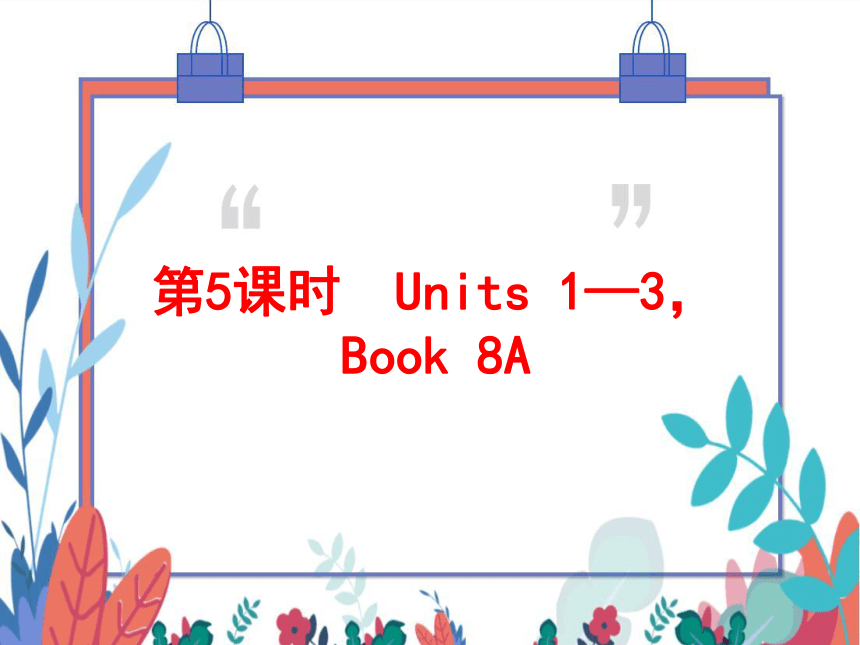 | |
| 格式 | ppt | ||
| 文件大小 | 978.0KB | ||
| 资源类型 | 试卷 | ||
| 版本资源 | 通用版 | ||
| 科目 | 英语 | ||
| 更新时间 | 2022-06-01 15:06:18 | ||
图片预览

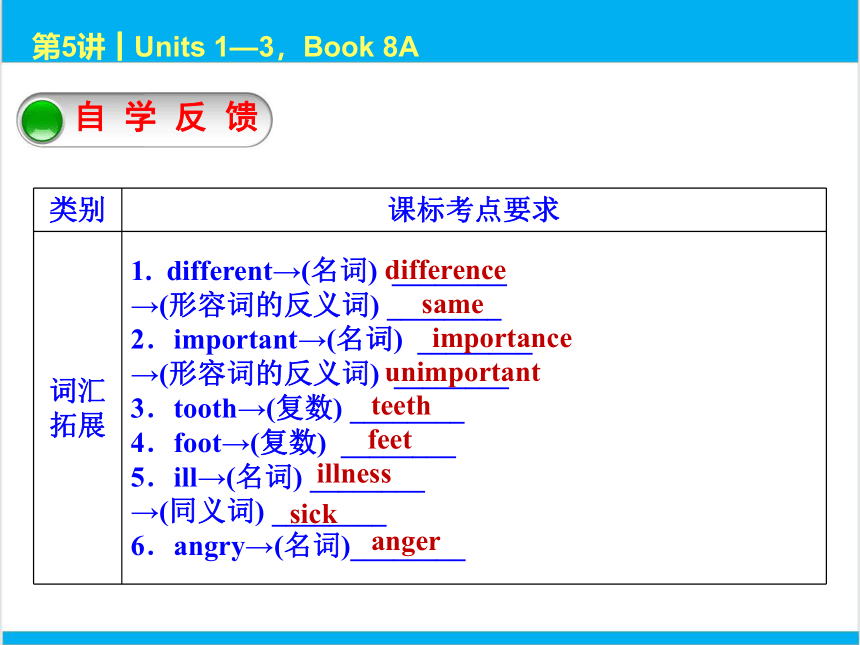
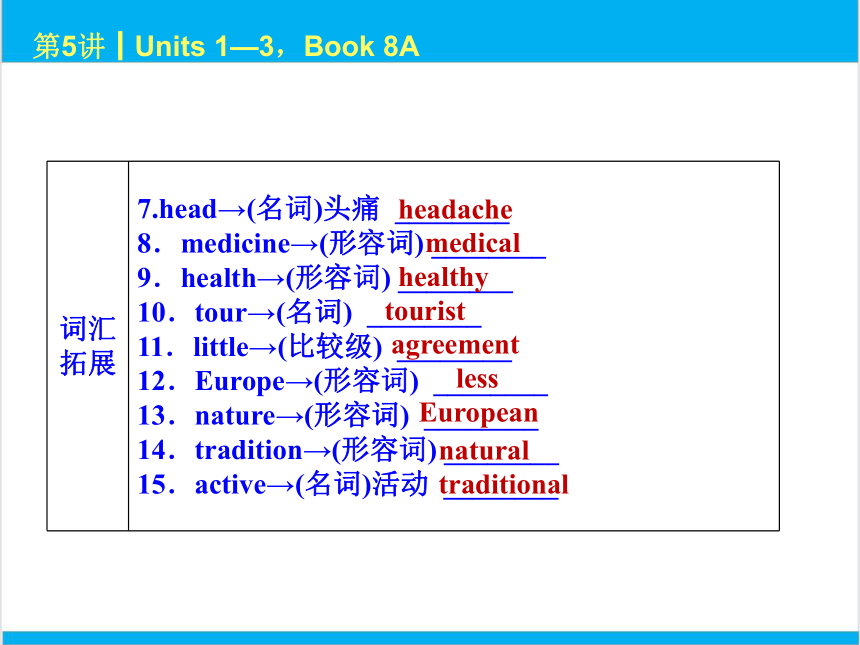
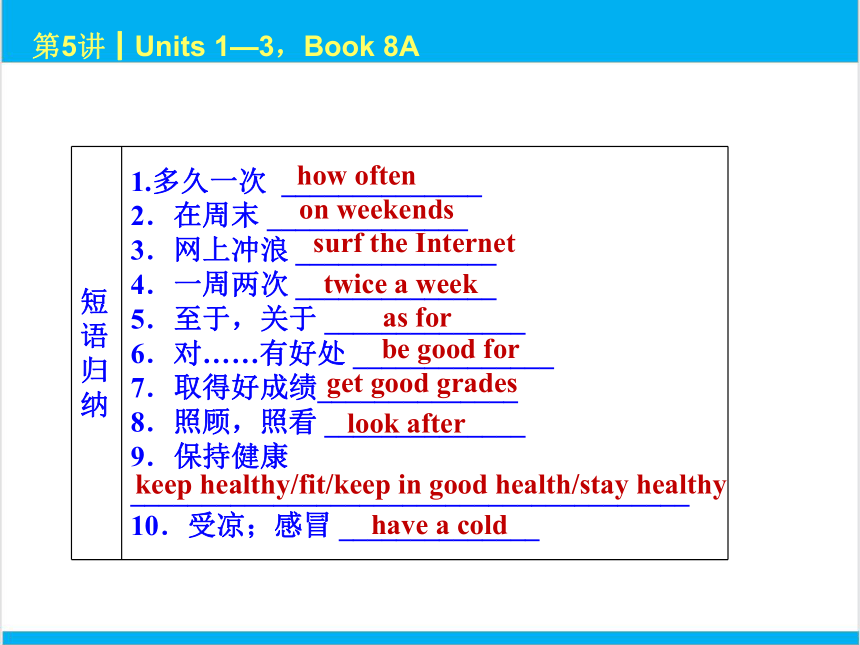
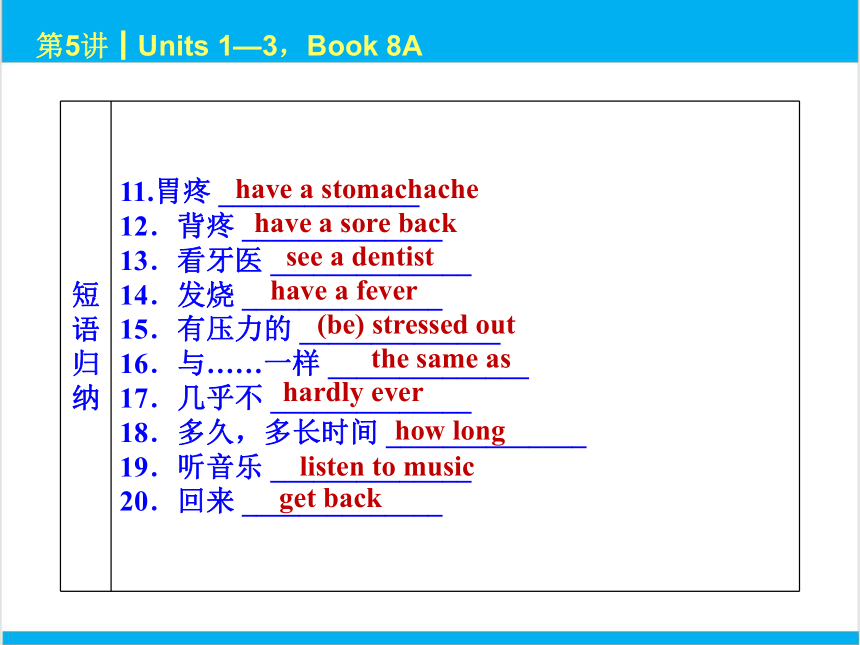
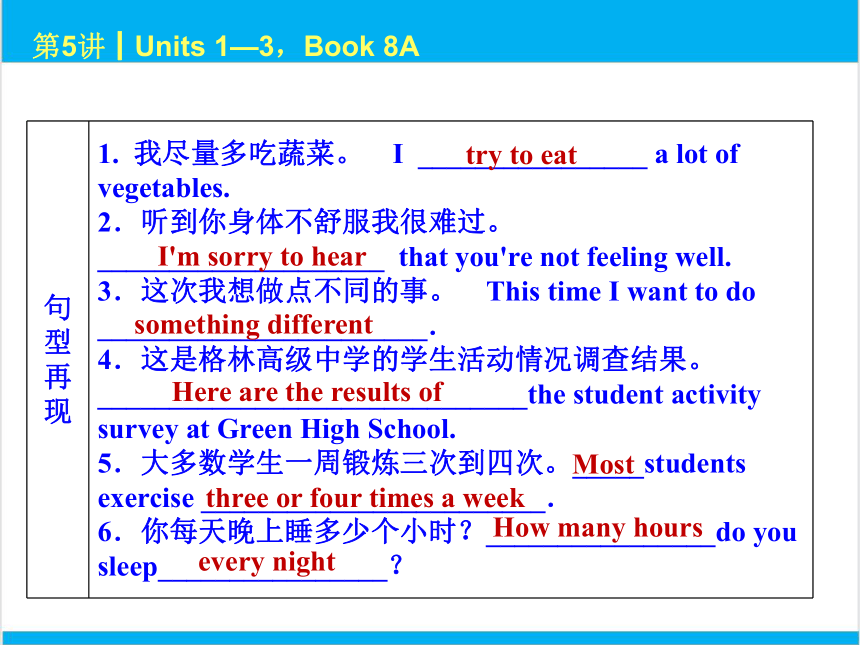
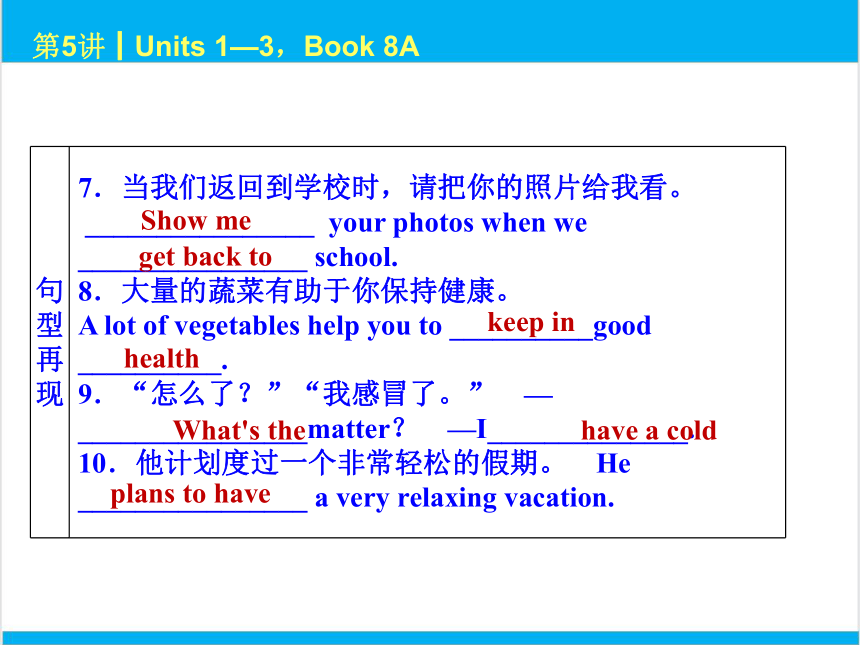
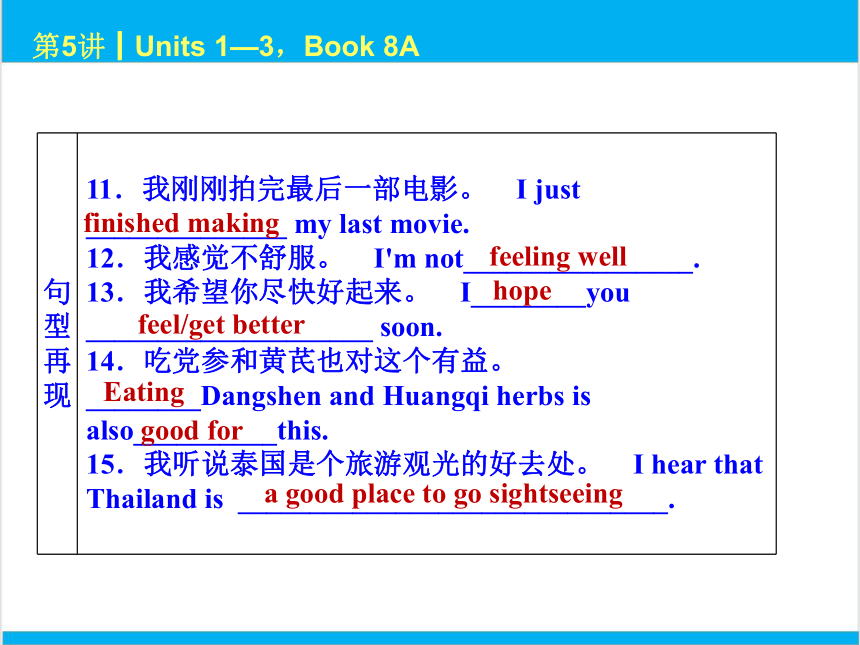
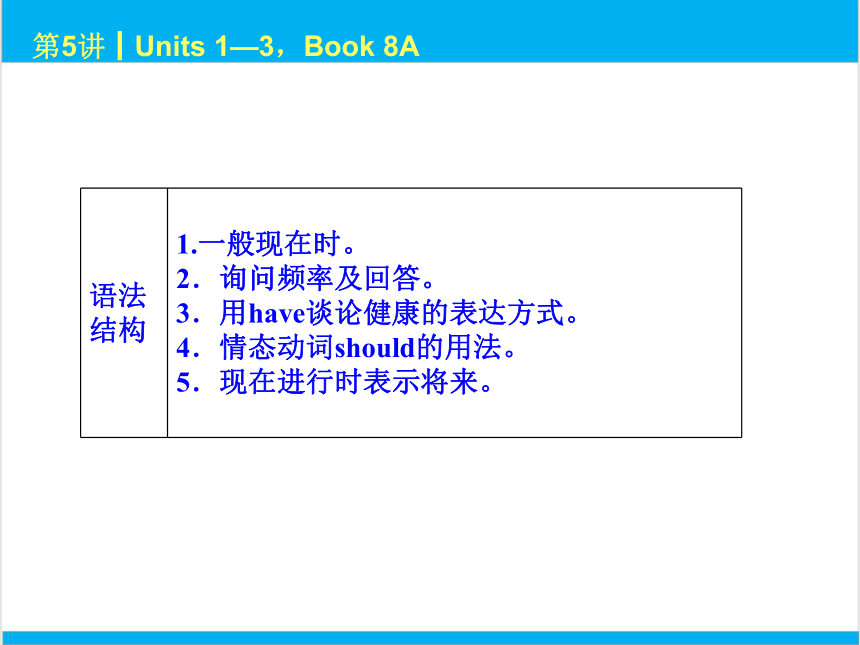
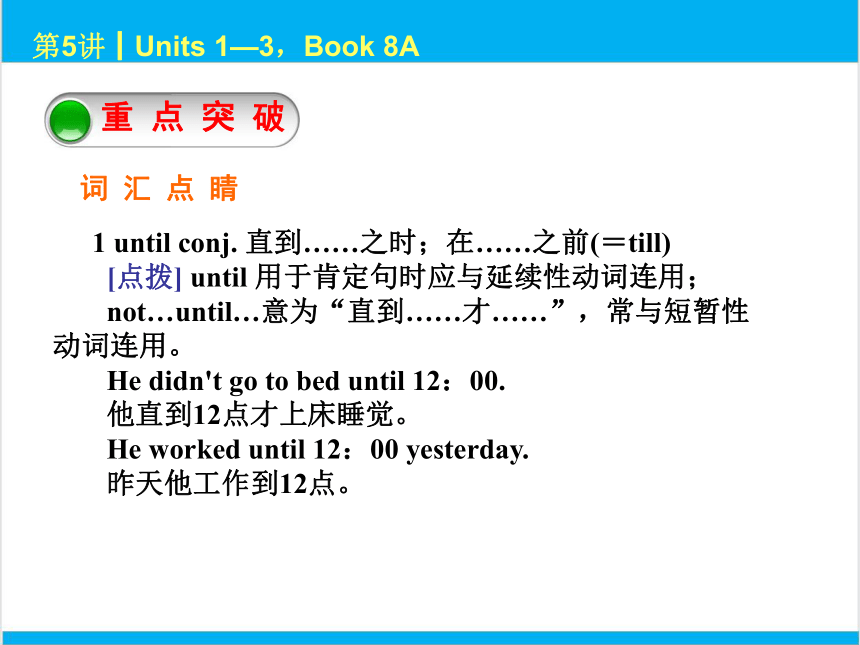
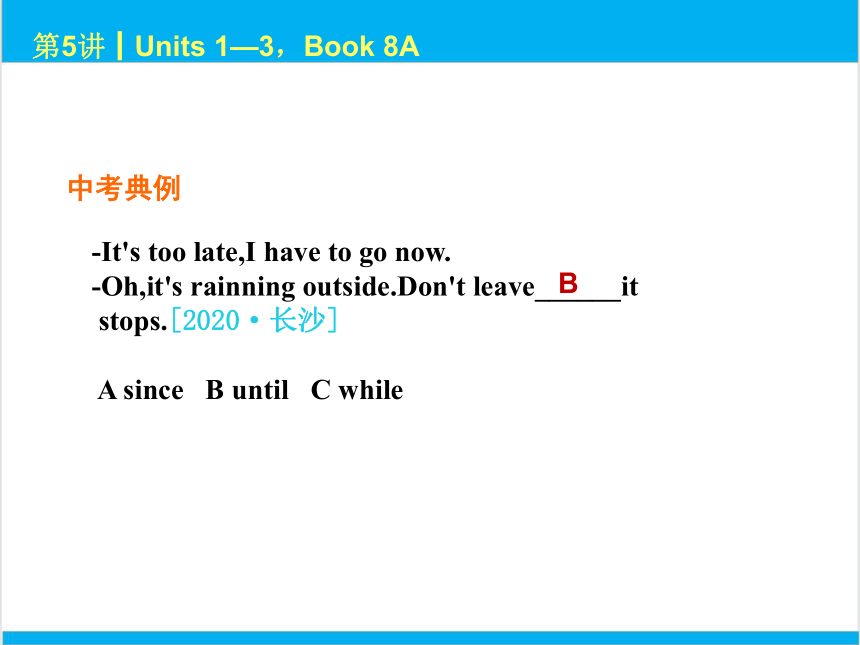
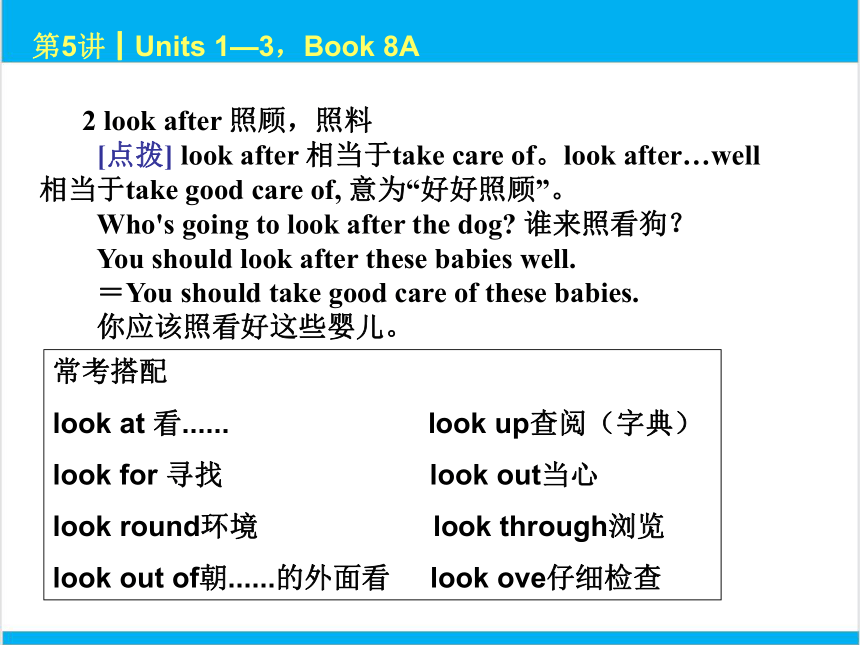
文档简介
(共37张PPT)
第5课时 Units 1—3,Book 8A
第5讲┃Units 1—3,Book 8A
自 学 反 馈
类别 课标考点要求
词汇
拓展 1. different→(名词) ________
→(形容词的反义词) ________
2.important→(名词) ________
→(形容词的反义词) ________
3.tooth→(复数) ________
4.foot→(复数) ________
5.ill→(名词) ________
→(同义词) ________
6.angry→(名词)________
difference
importance
unimportant
teeth
feet
same
illness
sick
anger
第5讲┃Units 1—3,Book 8A
词汇
拓展 7.head→(名词)头痛 ________
8.medicine→(形容词) ________
9.health→(形容词) ________
10.tour→(名词) ________
11.little→(比较级) ________
12.Europe→(形容词) ________
13.nature→(形容词) ________
14.tradition→(形容词) ________
15.active→(名词)活动 ________
headache
medical
healthy
agreement
tourist
less
European
natural
traditional
第5讲┃Units 1—3,Book 8A
短语
归纳 1.多久一次 ______________
2.在周末 ______________
3.网上冲浪 ______________
4.一周两次 ______________
5.至于,关于 ______________
6.对……有好处 ______________
7.取得好成绩______________
8.照顾,照看 ______________
9.保持健康 _______________________________________
10.受凉;感冒 ______________
how often
on weekends
surf the Internet
twice a week
as for
be good for
get good grades
look after
keep healthy/fit/keep in good health/stay healthy
have a cold
短语
归纳 11.胃疼 ______________
12.背疼 ______________
13.看牙医 ______________
14.发烧 ______________
15.有压力的 ______________
16.与……一样 ______________
17.几乎不 ______________
18.多久,多长时间 ______________
19.听音乐 ______________
20.回来 ______________
have a stomachache
have a sore back
see a dentist
have a fever
(be) stressed out
the same as
hardly ever
how long
listen to music
get back
第5讲┃Units 1—3,Book 8A
第5讲┃Units 1—3,Book 8A
句型
再现 1. 我尽量多吃蔬菜。 I ________________ a lot of vegetables.
2.听到你身体不舒服我很难过。 ____________________ that you're not feeling well.
3.这次我想做点不同的事。 This time I want to do _______________________.
4.这是格林高级中学的学生活动情况调查结果。
______________________________the student activity survey at Green High School.
5.大多数学生一周锻炼三次到四次。_____students exercise ________________________.
6.你每天晚上睡多少个小时?________________do you sleep________________?
try to eat
I'm sorry to hear
something different
Here are the results of
three or four times a week
Most
every night
How many hours
第5讲┃Units 1—3,Book 8A
句型
再现 7.当我们返回到学校时,请把你的照片给我看。
________________ your photos when we ________________ school.
8.大量的蔬菜有助于你保持健康。
A lot of vegetables help you to __________good __________.
9.“怎么了?”“我感冒了。” —________________matter? —I______________.
10.他计划度过一个非常轻松的假期。 He ________________ a very relaxing vacation.
Show me
keep in
get back to
What's the
health
have a cold
plans to have
第5讲┃Units 1—3,Book 8A
句型
再现 11.我刚刚拍完最后一部电影。 I just ______________ my last movie.
12.我感觉不舒服。 I'm not________________.
13.我希望你尽快好起来。 I________you ____________________ soon.
14.吃党参和黄芪也对这个有益。 ________Dangshen and Huangqi herbs is also__________this.
15.我听说泰国是个旅游观光的好去处。 I hear that Thailand is ______________________________.
finished making
feel/get better
feeling well
hope
Eating
good for
a good place to go sightseeing
第5讲┃Units 1—3,Book 8A
语法
结构 1.一般现在时。
2.询问频率及回答。
3.用have谈论健康的表达方式。
4.情态动词should的用法。
5.现在进行时表示将来。
第5讲┃Units 1—3,Book 8A
词 汇 点 睛
1 until conj. 直到……之时;在……之前(=till)
[点拨] until 用于肯定句时应与延续性动词连用;
not…until…意为“直到……才……”,常与短暂性 动词连用。
He didn't go to bed until 12:00.
他直到12点才上床睡觉。
He worked until 12:00 yesterday.
昨天他工作到12点。
重 点 突 破
第5讲┃Units 1—3,Book 8A
中考典例
-It's too late,I have to go now.
-Oh,it's rainning outside.Don't leave______it
stops.[2020·长沙]
A since B until C while
B
第5讲┃Units 1—3,Book 8A
2 look after 照顾,照料
[点拨] look after 相当于take care of。look after…well相当于take good care of, 意为“好好照顾”。
Who's going to look after the dog 谁来照看狗?
You should look after these babies well.
=You should take good care of these babies.
你应该照看好这些婴儿。
常考搭配
look at 看...... look up查阅(字典)
look for 寻找 look out当心
look round环境 look through浏览
look out of朝......的外面看 look ove仔细检查
第5讲┃Units 1—3,Book 8A
3 the same as 与……相同
[点拨] 其反义短语为be different from。
do the same thing as sb 与某人做同样的事
look the same 看上去相同
Your pen is the same as mine.
你的钢笔和我的一样。
This dictionary is different from that one.
这本词典和那本不同。
第5讲┃Units 1—3,Book 8A
4 although conj. 虽然(=though)
[点拨] although 引导让步状语从句时,从句放在主句前后均可。但是,though/although和but不能同时出现在一个句子中。有此用法的词还有because 和so。
[注意] (1)若句中用了although 或though,就不能再用but, 但可用yet或still。
(2)though可作副词,表示“然而”,常位于句末,其前常用逗号与前句隔开。
Although/Though it was snowing, (yet)it was not very cold.
=It was snowing, but it was not very cold.
虽然在下雪,但不是很冷。
He passed the exam, he wasn't happy, though.
他通过了考试,然而他并不开心。
第5讲┃Units 1—3,Book 8A
5 advice n. 建议
[点拨] advice为不可数名词,可用some, much, a piece of, pieces of等修饰。
Mr Smith gave us a piece of advice on how to keep healthy. 史密斯先生给我们提了一条有关如何保持身体健康的建议。
第5讲┃Units 1—3,Book 8A
中考典例
-What______can you give me on learning English
-I think you could join an English club.
[2021·孝感]
A advice B news C messages D information
A
由答语句意可知问句是要对方提关于学英语的建议,advice是不可数名词。
解析
第5讲┃Units 1—3,Book 8A
6 famous adj. 著名的;出名的(=well?known)
Did Tina meet a famous actor
蒂娜碰见了一位著名的演员吗?
New York is famous for its skyscrapers.
纽约以其摩天大楼而出名。
He is famous as a writer.
他作为作家而出名。
常考搭配
be famous for 因......而出名
be famous as 作为......而出名
第5讲┃Units 1—3,Book 8A
1 how often/how long/how soon/how far
巧 辩 异 同
词组 用法 答语
howoften 对频率提问 always, usually, often, some times, once/twice a day/month, every day, hardly ever, never
how long 对时间段或长度提问 (for)three days/weeks/months, since two hours ago 等时间段;two meters long
第5讲┃Units 1—3,Book 8A
how soon 对将来的时间提问 in +一段时间
how far 对距离提问 ten kilometers/miles
第5讲┃Units 1—3,Book 8A
—How often do you exercise
你多久锻炼一次?
—Every day. 每天(都锻炼)。
—How long has he worked here
他在这里工作多久了?
—For ten years. 十年。
—How soon will they come back
他们将多久以后回来?
—In six days. 六天以后。
—How far is it from the park to the library
从公园到图书馆有多远?
—It's about three kilometers. 大约3公里。
第5讲┃Units 1—3,Book 8A
中考典例
(1)-Steve,______do you play basketball after school
-Twice a week.It can keep me healthy.[2018·菏泽]
A how far B how soon C how long D how often
D
根据“Twice a week.”确定是问频率。
解析
(2)-______have you lived with your grandparents
-About three years.[2019·临沂]
A how long B how many C how much D how often
由“About three years.”可知是问多长时间。
解析
A
第5讲┃Units 1—3,Book 8A
2 hardly/hard
单词 词性 意义
hardly 副词 几乎不;几乎没有
hard 副词 辛苦地;努力地;猛烈地
形容词 困难的(相当于difficult);
硬的;勤奋的;苛刻的
第5讲┃Units 1—3,Book 8A
He always works hard, but he can hardly make money. 他总是努力工作,但他几乎赚不到钱。
It's hard to climb the tree.
要爬上这棵树很难。
I don't think fast food is good for our health,so I______eat
it.[2020·南充]
A usually B hardly C always
B
中考典例
第5讲┃Units 1—3,Book 8A
3 be good for/be good at/be good to/be good with
(1)be good for 表示“对……有好(益)处”,反义词组为be bad for,表示“对……有害处”。
Eating too much is not good for your health.
吃得太多对你的健康没有好处。
(2)be good at表示“在……方面(学得,做得)好,擅长……”,后接名词或v. ing 形式,近义词组为do well in。
Some of us are good at swimming.
我们中有些人擅长游泳。
(3)be good to=be kind/friendly to,表示“对……仁慈(和善)”。
The old man is very good to the students.
那位老人对学生们很和善。
第5讲┃Units 1—3,Book 8A
(4)be good with=get on well with, 表示“与……相处融洽”。
Mr Smith is good with his neighbours.
史密斯先生和他的邻居们相处得很融洽。
中考典例
Practicing in groups is good______us to learn
English.[2019·南充]
A at B in C for
C
根据句意“小组练习对我们学英语有好处”确定选C。
解析
第5讲┃Units 1—3,Book 8A
4 much too/too much/too many
词组 意义 用法
much too 太、非常 后接副词或形容词
too much 太多 后接不可数名词
too many 太多 后接复数名词
第5讲┃Units 1—3,Book 8A
We are much too busy. 我们非常忙。
Don't eat too much junk food.
别吃太多垃圾食品。
There are too many people in the street.
街上人太多。
中考典例
-Why are you so tired these days
-Well,I have______homework to do.[2019·孝感]
A too much B too many
C much too D many too
A
第5讲┃Units 1—3,Book 8A
5 maybe/may be
Maybe your key is in the box.
=Your key may be in the box.
你的钥匙可能在盒子里。
词语 意义 用法
maybe 副词,意为“或许;大概”;同义词为perhaps
在句中作状语,常置于句首
maybe 这是“情态动词+动词原形”结构,意为“可能是;也许是 在句中作谓语
第5讲┃Units 1—3,Book 8A
6 a little/little/a few/few
词语 意义 用法
a little 一点儿;少量表示肯定 修饰不可数名词
little 很少的;几乎没有的表示否定
a few 少数的;几个;一些表示肯定 修饰复数名词
few 很少的;几乎没有的表示否定
第5讲┃Units 1—3,Book 8A
中考典例
The man has______friends in this city,so he often stays at
home.[2021·安顺]
A a few B few
C little D a little
B
第5讲┃Units 1—3,Book 8A
7 a number of/the number of
词组 意义 用法 谓语
a number of 许多的、大量的,
相当于many 后接复
数名词 复数
the number of ……的数量、
数目 后接复
数名词 单数
Every year a number of people come to visit our school.
每年都有许多人来参观我们学校。
Now the number of family cars is much larger than before.
现在家用汽车的数量比以前多了许多。
第5讲┃Units 1—3,Book 8A
中考典例
In our school library there______a number of books on science,and in these years the nmber of them______growing larger and larger.[2020·安顺]
A are ; is B fis ; are
C have ; are D has ; is
A
a number of(许多的/大量的)+复数名词+复数谓语动词;the number of(......的数量)+复数名词+单数谓语动词。
解析
第5讲┃Units 1—3,Book 8A
句 型 透 视
1 I try to eat a lot of vegetables.
我尽量多吃蔬菜。
[句型] try to do sth尽力去做某事
try doing sth试着做某事
try/do one's best to do sth 尽某人的最大努力去做某事
I'm trying to draw a horse. 我正在尽力画一匹马。
You'd better try doing the experiment in another way.
你最好尝试用别的方法做一下这个实验。
第5讲┃Units 1—3,Book 8A
2 —What's the matter 怎么了?
—I have a cold. 我感冒了。
[点拨] (1)What's the matter
=What's the trouble
=What's wrong 怎么了?
如果表示“某人(物)怎么了”,要在这几种形式后加上with sb/sth。
—What's the trouble/matter with you
=What's wrong with you?你怎么了?
—I have a stomachache. 我胃疼。
(2)“have+a+症状名词”表示具有某种“病症、症状”,有“患(病)”的意思,其中不定冠词a不可省略。
I have a headache and a cough.
我头疼而且咳嗽。
第5讲┃Units 1—3,Book 8A
3 It's easy to have a healthy lifestyle, and it's important to eat a balanced diet. 拥有健康的生活方式是容易的,而均衡饮食尤为重要。
[句型] “It's+形容词+(for/of sb)+to do sth” 意为“做某事(对某人而言)是……”。it是形式主语,真正的主语是后面的动词不定式短语to do sth,形容词作表语。
[拓展] for和of的选择取决于前面的形容词:若形容词(important, interesting, easy, hard, difficult等)是对动作进行评价,则用for;若形容词(kind, clever, wise, foolish等)是描述动作执行者的性格或品质,则用of。
It's very kind of you to help me.
你能帮我,真好。
It's difficult for us to climb up the tree.
对我们来说,爬上那棵树是很困难的。
第5讲┃Units 1—3,Book 8A
中考典例
______is really hard______them to climb such a high
mountain.[2019·白银]
A. This ; to B. It ; to
C. This ; for D. It ; for
本题考查句型:It's+形容词+for sb+to do sth,意为“对某人来说做某事......”,句中的it作形式主语,不定式作真正的主语。
解析
D
第5讲┃Units 1—3,Book 8A
4 I just finished making my last movie.
我刚刚拍完最后一部电影。
[点拨] finish doing sth 意为“做完某事”。
I can finish reading the book today.
今天我能看完这本书。
[拓展] be busy, mind, practice, keep, enjoy等和finish用法相同,后接v. ing。
中考典例
Why not______your teacher for help when you can't
finish______the story by youself [2019·乌鲁木齐]
A. to ask ; write B. to ask ; writing
C. ask ; writing D. asking ; to write
C
第5课时 Units 1—3,Book 8A
第5讲┃Units 1—3,Book 8A
自 学 反 馈
类别 课标考点要求
词汇
拓展 1. different→(名词) ________
→(形容词的反义词) ________
2.important→(名词) ________
→(形容词的反义词) ________
3.tooth→(复数) ________
4.foot→(复数) ________
5.ill→(名词) ________
→(同义词) ________
6.angry→(名词)________
difference
importance
unimportant
teeth
feet
same
illness
sick
anger
第5讲┃Units 1—3,Book 8A
词汇
拓展 7.head→(名词)头痛 ________
8.medicine→(形容词) ________
9.health→(形容词) ________
10.tour→(名词) ________
11.little→(比较级) ________
12.Europe→(形容词) ________
13.nature→(形容词) ________
14.tradition→(形容词) ________
15.active→(名词)活动 ________
headache
medical
healthy
agreement
tourist
less
European
natural
traditional
第5讲┃Units 1—3,Book 8A
短语
归纳 1.多久一次 ______________
2.在周末 ______________
3.网上冲浪 ______________
4.一周两次 ______________
5.至于,关于 ______________
6.对……有好处 ______________
7.取得好成绩______________
8.照顾,照看 ______________
9.保持健康 _______________________________________
10.受凉;感冒 ______________
how often
on weekends
surf the Internet
twice a week
as for
be good for
get good grades
look after
keep healthy/fit/keep in good health/stay healthy
have a cold
短语
归纳 11.胃疼 ______________
12.背疼 ______________
13.看牙医 ______________
14.发烧 ______________
15.有压力的 ______________
16.与……一样 ______________
17.几乎不 ______________
18.多久,多长时间 ______________
19.听音乐 ______________
20.回来 ______________
have a stomachache
have a sore back
see a dentist
have a fever
(be) stressed out
the same as
hardly ever
how long
listen to music
get back
第5讲┃Units 1—3,Book 8A
第5讲┃Units 1—3,Book 8A
句型
再现 1. 我尽量多吃蔬菜。 I ________________ a lot of vegetables.
2.听到你身体不舒服我很难过。 ____________________ that you're not feeling well.
3.这次我想做点不同的事。 This time I want to do _______________________.
4.这是格林高级中学的学生活动情况调查结果。
______________________________the student activity survey at Green High School.
5.大多数学生一周锻炼三次到四次。_____students exercise ________________________.
6.你每天晚上睡多少个小时?________________do you sleep________________?
try to eat
I'm sorry to hear
something different
Here are the results of
three or four times a week
Most
every night
How many hours
第5讲┃Units 1—3,Book 8A
句型
再现 7.当我们返回到学校时,请把你的照片给我看。
________________ your photos when we ________________ school.
8.大量的蔬菜有助于你保持健康。
A lot of vegetables help you to __________good __________.
9.“怎么了?”“我感冒了。” —________________matter? —I______________.
10.他计划度过一个非常轻松的假期。 He ________________ a very relaxing vacation.
Show me
keep in
get back to
What's the
health
have a cold
plans to have
第5讲┃Units 1—3,Book 8A
句型
再现 11.我刚刚拍完最后一部电影。 I just ______________ my last movie.
12.我感觉不舒服。 I'm not________________.
13.我希望你尽快好起来。 I________you ____________________ soon.
14.吃党参和黄芪也对这个有益。 ________Dangshen and Huangqi herbs is also__________this.
15.我听说泰国是个旅游观光的好去处。 I hear that Thailand is ______________________________.
finished making
feel/get better
feeling well
hope
Eating
good for
a good place to go sightseeing
第5讲┃Units 1—3,Book 8A
语法
结构 1.一般现在时。
2.询问频率及回答。
3.用have谈论健康的表达方式。
4.情态动词should的用法。
5.现在进行时表示将来。
第5讲┃Units 1—3,Book 8A
词 汇 点 睛
1 until conj. 直到……之时;在……之前(=till)
[点拨] until 用于肯定句时应与延续性动词连用;
not…until…意为“直到……才……”,常与短暂性 动词连用。
He didn't go to bed until 12:00.
他直到12点才上床睡觉。
He worked until 12:00 yesterday.
昨天他工作到12点。
重 点 突 破
第5讲┃Units 1—3,Book 8A
中考典例
-It's too late,I have to go now.
-Oh,it's rainning outside.Don't leave______it
stops.[2020·长沙]
A since B until C while
B
第5讲┃Units 1—3,Book 8A
2 look after 照顾,照料
[点拨] look after 相当于take care of。look after…well相当于take good care of, 意为“好好照顾”。
Who's going to look after the dog 谁来照看狗?
You should look after these babies well.
=You should take good care of these babies.
你应该照看好这些婴儿。
常考搭配
look at 看...... look up查阅(字典)
look for 寻找 look out当心
look round环境 look through浏览
look out of朝......的外面看 look ove仔细检查
第5讲┃Units 1—3,Book 8A
3 the same as 与……相同
[点拨] 其反义短语为be different from。
do the same thing as sb 与某人做同样的事
look the same 看上去相同
Your pen is the same as mine.
你的钢笔和我的一样。
This dictionary is different from that one.
这本词典和那本不同。
第5讲┃Units 1—3,Book 8A
4 although conj. 虽然(=though)
[点拨] although 引导让步状语从句时,从句放在主句前后均可。但是,though/although和but不能同时出现在一个句子中。有此用法的词还有because 和so。
[注意] (1)若句中用了although 或though,就不能再用but, 但可用yet或still。
(2)though可作副词,表示“然而”,常位于句末,其前常用逗号与前句隔开。
Although/Though it was snowing, (yet)it was not very cold.
=It was snowing, but it was not very cold.
虽然在下雪,但不是很冷。
He passed the exam, he wasn't happy, though.
他通过了考试,然而他并不开心。
第5讲┃Units 1—3,Book 8A
5 advice n. 建议
[点拨] advice为不可数名词,可用some, much, a piece of, pieces of等修饰。
Mr Smith gave us a piece of advice on how to keep healthy. 史密斯先生给我们提了一条有关如何保持身体健康的建议。
第5讲┃Units 1—3,Book 8A
中考典例
-What______can you give me on learning English
-I think you could join an English club.
[2021·孝感]
A advice B news C messages D information
A
由答语句意可知问句是要对方提关于学英语的建议,advice是不可数名词。
解析
第5讲┃Units 1—3,Book 8A
6 famous adj. 著名的;出名的(=well?known)
Did Tina meet a famous actor
蒂娜碰见了一位著名的演员吗?
New York is famous for its skyscrapers.
纽约以其摩天大楼而出名。
He is famous as a writer.
他作为作家而出名。
常考搭配
be famous for 因......而出名
be famous as 作为......而出名
第5讲┃Units 1—3,Book 8A
1 how often/how long/how soon/how far
巧 辩 异 同
词组 用法 答语
howoften 对频率提问 always, usually, often, some times, once/twice a day/month, every day, hardly ever, never
how long 对时间段或长度提问 (for)three days/weeks/months, since two hours ago 等时间段;two meters long
第5讲┃Units 1—3,Book 8A
how soon 对将来的时间提问 in +一段时间
how far 对距离提问 ten kilometers/miles
第5讲┃Units 1—3,Book 8A
—How often do you exercise
你多久锻炼一次?
—Every day. 每天(都锻炼)。
—How long has he worked here
他在这里工作多久了?
—For ten years. 十年。
—How soon will they come back
他们将多久以后回来?
—In six days. 六天以后。
—How far is it from the park to the library
从公园到图书馆有多远?
—It's about three kilometers. 大约3公里。
第5讲┃Units 1—3,Book 8A
中考典例
(1)-Steve,______do you play basketball after school
-Twice a week.It can keep me healthy.[2018·菏泽]
A how far B how soon C how long D how often
D
根据“Twice a week.”确定是问频率。
解析
(2)-______have you lived with your grandparents
-About three years.[2019·临沂]
A how long B how many C how much D how often
由“About three years.”可知是问多长时间。
解析
A
第5讲┃Units 1—3,Book 8A
2 hardly/hard
单词 词性 意义
hardly 副词 几乎不;几乎没有
hard 副词 辛苦地;努力地;猛烈地
形容词 困难的(相当于difficult);
硬的;勤奋的;苛刻的
第5讲┃Units 1—3,Book 8A
He always works hard, but he can hardly make money. 他总是努力工作,但他几乎赚不到钱。
It's hard to climb the tree.
要爬上这棵树很难。
I don't think fast food is good for our health,so I______eat
it.[2020·南充]
A usually B hardly C always
B
中考典例
第5讲┃Units 1—3,Book 8A
3 be good for/be good at/be good to/be good with
(1)be good for 表示“对……有好(益)处”,反义词组为be bad for,表示“对……有害处”。
Eating too much is not good for your health.
吃得太多对你的健康没有好处。
(2)be good at表示“在……方面(学得,做得)好,擅长……”,后接名词或v. ing 形式,近义词组为do well in。
Some of us are good at swimming.
我们中有些人擅长游泳。
(3)be good to=be kind/friendly to,表示“对……仁慈(和善)”。
The old man is very good to the students.
那位老人对学生们很和善。
第5讲┃Units 1—3,Book 8A
(4)be good with=get on well with, 表示“与……相处融洽”。
Mr Smith is good with his neighbours.
史密斯先生和他的邻居们相处得很融洽。
中考典例
Practicing in groups is good______us to learn
English.[2019·南充]
A at B in C for
C
根据句意“小组练习对我们学英语有好处”确定选C。
解析
第5讲┃Units 1—3,Book 8A
4 much too/too much/too many
词组 意义 用法
much too 太、非常 后接副词或形容词
too much 太多 后接不可数名词
too many 太多 后接复数名词
第5讲┃Units 1—3,Book 8A
We are much too busy. 我们非常忙。
Don't eat too much junk food.
别吃太多垃圾食品。
There are too many people in the street.
街上人太多。
中考典例
-Why are you so tired these days
-Well,I have______homework to do.[2019·孝感]
A too much B too many
C much too D many too
A
第5讲┃Units 1—3,Book 8A
5 maybe/may be
Maybe your key is in the box.
=Your key may be in the box.
你的钥匙可能在盒子里。
词语 意义 用法
maybe 副词,意为“或许;大概”;同义词为perhaps
在句中作状语,常置于句首
maybe 这是“情态动词+动词原形”结构,意为“可能是;也许是 在句中作谓语
第5讲┃Units 1—3,Book 8A
6 a little/little/a few/few
词语 意义 用法
a little 一点儿;少量表示肯定 修饰不可数名词
little 很少的;几乎没有的表示否定
a few 少数的;几个;一些表示肯定 修饰复数名词
few 很少的;几乎没有的表示否定
第5讲┃Units 1—3,Book 8A
中考典例
The man has______friends in this city,so he often stays at
home.[2021·安顺]
A a few B few
C little D a little
B
第5讲┃Units 1—3,Book 8A
7 a number of/the number of
词组 意义 用法 谓语
a number of 许多的、大量的,
相当于many 后接复
数名词 复数
the number of ……的数量、
数目 后接复
数名词 单数
Every year a number of people come to visit our school.
每年都有许多人来参观我们学校。
Now the number of family cars is much larger than before.
现在家用汽车的数量比以前多了许多。
第5讲┃Units 1—3,Book 8A
中考典例
In our school library there______a number of books on science,and in these years the nmber of them______growing larger and larger.[2020·安顺]
A are ; is B fis ; are
C have ; are D has ; is
A
a number of(许多的/大量的)+复数名词+复数谓语动词;the number of(......的数量)+复数名词+单数谓语动词。
解析
第5讲┃Units 1—3,Book 8A
句 型 透 视
1 I try to eat a lot of vegetables.
我尽量多吃蔬菜。
[句型] try to do sth尽力去做某事
try doing sth试着做某事
try/do one's best to do sth 尽某人的最大努力去做某事
I'm trying to draw a horse. 我正在尽力画一匹马。
You'd better try doing the experiment in another way.
你最好尝试用别的方法做一下这个实验。
第5讲┃Units 1—3,Book 8A
2 —What's the matter 怎么了?
—I have a cold. 我感冒了。
[点拨] (1)What's the matter
=What's the trouble
=What's wrong 怎么了?
如果表示“某人(物)怎么了”,要在这几种形式后加上with sb/sth。
—What's the trouble/matter with you
=What's wrong with you?你怎么了?
—I have a stomachache. 我胃疼。
(2)“have+a+症状名词”表示具有某种“病症、症状”,有“患(病)”的意思,其中不定冠词a不可省略。
I have a headache and a cough.
我头疼而且咳嗽。
第5讲┃Units 1—3,Book 8A
3 It's easy to have a healthy lifestyle, and it's important to eat a balanced diet. 拥有健康的生活方式是容易的,而均衡饮食尤为重要。
[句型] “It's+形容词+(for/of sb)+to do sth” 意为“做某事(对某人而言)是……”。it是形式主语,真正的主语是后面的动词不定式短语to do sth,形容词作表语。
[拓展] for和of的选择取决于前面的形容词:若形容词(important, interesting, easy, hard, difficult等)是对动作进行评价,则用for;若形容词(kind, clever, wise, foolish等)是描述动作执行者的性格或品质,则用of。
It's very kind of you to help me.
你能帮我,真好。
It's difficult for us to climb up the tree.
对我们来说,爬上那棵树是很困难的。
第5讲┃Units 1—3,Book 8A
中考典例
______is really hard______them to climb such a high
mountain.[2019·白银]
A. This ; to B. It ; to
C. This ; for D. It ; for
本题考查句型:It's+形容词+for sb+to do sth,意为“对某人来说做某事......”,句中的it作形式主语,不定式作真正的主语。
解析
D
第5讲┃Units 1—3,Book 8A
4 I just finished making my last movie.
我刚刚拍完最后一部电影。
[点拨] finish doing sth 意为“做完某事”。
I can finish reading the book today.
今天我能看完这本书。
[拓展] be busy, mind, practice, keep, enjoy等和finish用法相同,后接v. ing。
中考典例
Why not______your teacher for help when you can't
finish______the story by youself [2019·乌鲁木齐]
A. to ask ; write B. to ask ; writing
C. ask ; writing D. asking ; to write
C
